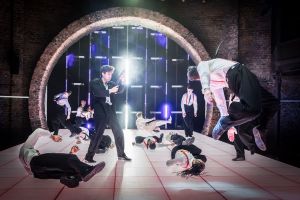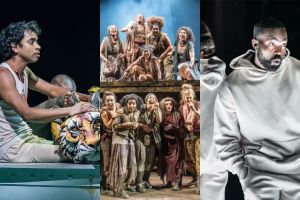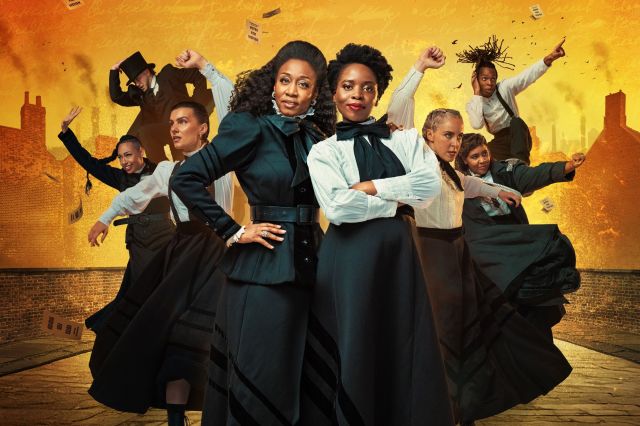Nick Blood: Why You Should Come & See … Backbeat
Iain Softley and Stephen Jeffreys‘s Backbeat – the story of how the Beatles became the Beatles and the band’s formative stint performing in Hamburg’s red-light district – opened at the West End’s Duke of York’s Theatre on 10 October 2011 (previews from 24 September) where it will run until 18 February 2012.
It stars Andrew Knott, Daniel Healy, William Payne and Oliver Bennett as the Fab Four alongside Ruta Gedmintas as photographer Astrid Kirchherr.
Whatsonstage.com’s Andrew Girvan speaks to Nick Blood, who alongside with the rest of the Backbeat cast is nominated for Best Ensemble Performance at the 2012 Whatsonstage.com Awards, about playing the Beatles original bassist, Stuart Sutcliffe and his thoughts on the show.
Can you tell me about the show and the role that you play?
Backbeat is a show about a group of young lads, who just so happened to be the Beatles. They go to Hamburg, to ply their trade as rock ‘n’ rollers. The show centres on the relationship between Stu Sutcliffe, who I play, and Ruta Gedmintas who plays Astrid Kirchherr.
There is a kind of triangular relationship between the pair of them and John Lennon. Lennon and Suttcliffe were best mates, and John persuaded Stu to join his band. He’d never played bass before. Then they go off to Hamburg. Stu falls in love with Astrid, and it’s about the choices that those young men made. Between choosing the girl he loves and his art (he was a really good artist) or being in the band. John Lennon is just hell-bent on the success of the Beatles.
It’s set against this backdrop of the early days of the Beatles, interspersed with all of the music from that era. But essentially it’s a play about relationships, like most good stories, and good plays. It’s about giving people an insight into what happened before we knew the Beatles, I think that’s exciting for people.
I’d known about the story to a certain extent. I know my impression of the Beatles had always been of this sanitised, clean-cut pop group. In actual fact they were just like anybody else.
They just went off, they wanted to be in a band. I think like most people who want to be in a band, it’s because they wanted to pull girls. They’re off over there drinking, taking speed, kissing girls and a bit more. That’s what I like about it. You get to understand a bit more about how you get to be that successful. I think it’s hard to be that successful and just be a cheery chappy. I think you’ve got to have drive, if you’re ultimate ambition is to be the best of the best, then there’s going to have to be some sacrifice. Friendships, relationships, family, you’re going to have to put those things to one side. Those aren’t necessarily good qualities.
Do you think you’ve encountered any of that sacrifice in your own performing career?
Yeah, I suppose. In as much as I’m single, my younger sister has had kids but I don’t see myself having any for a long time, I don’t own a house, I don’t have any long-term security financially really, because I haven’t been working long enough to.
I think you are sacrificing things. When I was at drama school you were there 10 hours a day, if not 12 hours a day and at weekends. Inevitably you don’t see your friends, you don’t see your family. I’ve got some amazing friends from where I grew up, but you don’t see them as much. My working hours are really different, so you are sacrificing some things, but I know I wouldn’t be happy doing anything else.
You’ve spoken about the camaraderie in the bunch of young lads, are you feeling any of that backstage?
I think it’s different in that we don’t have as much downtime as they did. We don’t have to live together and we’re not living away from home, but there is inevitably a kind of band mentality. Different people spend their time with different people. There’s the odd row, there’s great banter. You can’t say anything in the dressing rooms without being cut to shreds.
Is it more intense because you’re going out there as a band and playing every night? That’s something not a lot of West End companies have to bond them.
There is that. The fact that the guys who play the Beatles are on stage nearly the whole time – you hardly leave. There is something when you’re on stage. We expect a lot of each other because you can’t let each other down. If anyone does let anything slip you’re straight on them.
We do get irritated by each other now and then. Not in a nasty way, but because you want them to shut up, or you want a bit of piece and quiet, and there’s a lot of that. There’s a lot of laughs in the dressing room. In that respect I think we really are like a band, we bring different things to it. We all have really different personalities. Fortunately we don’t have to spend 24/7 with each other, because we probably would kill each other.
Your character learns to play the bass. That’s something you’ve had to do as well?
Yes. During the audition process I had to go and meet the musical supervisor who gave me a bass lesson. I didn’t feel too bad, because sometimes when you go to auditions you say, “yeah, yeah, I can do that” when you can’t really. Then you’re panicking when they ask you to do it! With this I was just totally honest. I wasn’t trying to kid anyone. I just thought I’d give it my all and they obviously thought I had enough ability to learn.
It was pretty intense. I didn’t have any actual lessons, but someone would show you the riff then it was just a case of practicing, practicing, practicing. I don’t know how read music, so I ended up with my own set of notations. A lot of it was just being chucked in the deep end, like learning a language and being dumped into a country. If you don’t speak a language, you just have to learn it. Even if I’d decided that I wanted to join a band or something, or that I wanted to learn bass, it wasn’t something I would have been able to do.
Are you enjoying playing now? Is it something you’re finding joy in?
Well I’ve been asked to join a band, and I did get a bass line to learn, but then the guy who asked me got another band. I’d been sitting practicing loads, but then he was like, “I’ve used it for my other band now,” so that was that. I’m buying a bass guitar soon though. It’s a lot of fun.
The rest of the cast are playing such iconic figures. Do you feel you have a degree of anonymity in the character of Stuart Sutcliffe?
Yeah, no one is going to pick you up and criticise you, because there’s no real footage of him. It is tough because people have an expectation of what those other Beatles are going to be. I think Andrew Knott, who plays Lennon, is quite right: you have to stamp your mark in it. Because at the end of the day you’ve got to do all your work and then let it go. You stamp your mark on it and then the audience should be buying into your performance. They’re not there thinking “oh, that was a bit like John Lennon.”
I’ve got no interest in doing an impression of someone. If you go expecting to see a copy of John Lennon or Paul McCartney, I think you might as well go and see a tribute act.
I did my best to serve Stuart Sutcliffe’s memory. Looking at photos, getting an idea of how he stands and to some extent how he moves. You really can read everything written about him, because there’s only a limited amount.
Then his sister, who is the executor of his estate and wrote a famous book about him, came to see it. I couldn’t have wished for a better response. She was in tears watching it, and we had a long chat about it afterwards. She was really pleased with my performance, it was brilliant. I spent ages with her and her partner and friends. It meant a lot to me. She wanted to get photos with me. It was pretty special. That and my Mum liking it meant the world.
Congratulations on your Whatsonstage.com Awards nomination and thanks for performing at the Awards Launch last week
We’ve always kind of felt a vibe from the audience, that they love it. The response you get every night at the curtain call and the people you meet afterwards. It’s great to be nominated for anything really. The fact that it’s the people who nominate, is just a bit different. Being nominated by the general public over a judging panel, I’m not sure if I’d pick one over the other, but it’s nice to think that the theatregoers who actually pay the money have said they’ve enjoyed it.












